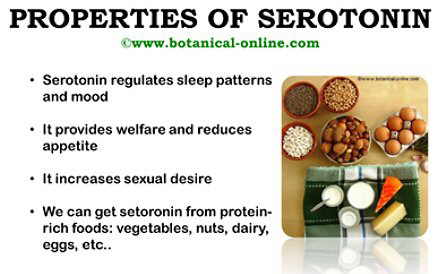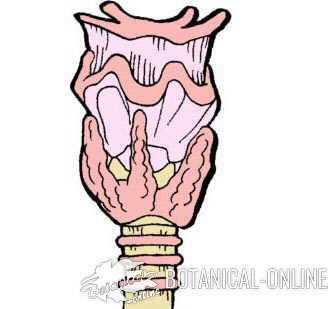Contents
- 1 Characteristics and benefits of serotonin
- 1.1 SEROTONIN CHARACTERISTICS
- 1.2 What is serotonin?
- 1.3 Functions of serotonin
- 1.4 Serotonin to regulate sleep
- 1.5 Serotonin to set the mood
- 1.6 Lack of serotonin as the reason of many mind and body disorders
- 1.7 Serotonin to regulate certain body processes
- 1.8 Serotonin is involved in numerous physiological functions
- 1.9 FACTORS THAT LOWER SEROTONIN LEVELS
- 1.10 What can decrease serotonin?
- 1.11 Factors that increase serotonin levels
Characteristics and benefits of serotonin
SEROTONIN CHARACTERISTICS
What is serotonin?
Serotonin is a neurotransmitter, a substance that is responsible for transmitting nerve signals through neurons. It was first isolated in 1948 by Irvine Page, Maurice M. Rapport and Arda Green. It is scientifically known as 5-hydroxytryptamine, or 5-HT.
Serotonin name comes from the word “serum = plasma of blood” because when they discovered it, it was found to be a substance with a vasoconstrictor function, that’s to say it causes a narrowing of blood vessels.
Humans have between 5 and 10 mg of serotonin in their body, 90% of it is in the intestine, whereas most of the remaining 10% appears in the blood platelets and brain. It is a derivative of the amino acid tryptophan.
Serotonin is a substance unique to the human body. It appears in certain fungi, plants and animals. For example it has been discovered in the venom of scorpions and bees.
Functions of serotonin
 Main medicinal properties of serotonin
Main medicinal properties of serotonin
The main role of serotonin is to act as a neurotransmitter to intervene in many functions. Among them, we can mention the following:
Serotonin to regulate sleep
Serotonin is involved in the production of melatonin a hormone that regulates sleep cycles. Melatonin is produced in the pineal gland and, among other things, makes us sleep. The levels of this hormone are higher in those hours when the human body feels the need for sleep, while they are lower during the day when we stay awake.
To get a peaceful sleep and control the timing of sleep, serotonin is also involved in the stress management and body temperature.
Human studies have shown that administration by injections of this hormone produced in the subjects the need for sleep.
Similarly it is believed that melatonin deficiency may be responsible for many sleep disorders, such as insomnia.
Serotonin to set the mood
 Good levels of serotonin are necessary for well-being
Good levels of serotonin are necessary for well-being
Serotonin has a critical role in our mood. It has been shown that the existence of low levels of serotonin are responsible for many anomalies of personality and, in particular for the appearance of numerous cases of depression and especially in relation to seasonal depression
Numerous studies have revealed low levels of serotonin in the brain tissues of people with depression. Depressive states can cause many negative symptoms such as anxiety, insecurity, fear, fatigue, personal contempt, suicidal thoughts, etc.
With regard to seasonal depression, during the fall and winter, as a result of reduced light, there is an increase of melatonin, which results in decreased levels of serotonin. This component is very important in the regulation of mood and sleep-wake cycles.
- Good levels of serotonin are necessary for the body to be balanced. Adequate serotonin give us quietness, personal confidence, happiness and help us sleep well.
The increase of melatonin and decrease of serotonin appear to be responsible for the lack of interest, for the desire to be always sleeping or for the urge to eat all the time, some symptoms that generally occur when you are suffering from seasonal depression.
Antidepressants, especially selective serotonin reuptake inhibitors (SSRIs), such as Prozac, are used to prevent neurons too absorb too much serotonin so they get increasing levels of serotonin available in the body, especially in the brain. This will get improve mood and prevent depression.
Lack of serotonin as the reason of many mind and body disorders
In addition to depression, low serotonin levels seem to have an important role in the onset of other disorders such as OCD (obsessive compulsive disorder), schizophrenia, chronic fatigue syndrome, increased aggressiveness, violent behavior or out of control outbursts
Other problems could also be related to the same reason, such as increased pain in people with fibromyalgia, the craving for food and mood swings during premenstrual syndrome, thinking problems, trouble in concentrating or making decisions, loss of interest in activities that were considered pleasurable before, compulsion to drink, etc.
Serotonin to regulate certain body processes
Serotonin is involved in the appetite control. Adequate levels of this neurotransmitter determine the feeling of satiety, while low levels of it increases the need to eat, especially carbohydrates.
Some abnormalities have been linked to serotonin levels with eating disorders, and especially with bulimia. Some cases of obesity seem to have enough relation with this component. To address the problem of obesity in people weighing more than 30% of their ideal weight, doctors have used drugs, such as dexfenfluramine, that inhibit the absorption of serotonin in the cell, so that obese people feel full and do not need to eat so much.
Serotonin also plays an important role in couples activity, acting as a stimulant . Serotonin takes part in numerous physiological functions
Serotonin is involved in numerous physiological functions
For example:
- Constriction of blood vessels
- Gastric secretions (inhibits production of hydrochloric acid)
- Production of many hormones
- Muscle stimulation (for example, stimulates contraction of intestinal wall)
- The regeneration of liver cell or mitosis processes (promotes cell division)
- etc.
FACTORS THAT LOWER SEROTONIN LEVELS
What can decrease serotonin?

Too much heat decreases serotonin levels
Serotonin levels should be balanced for proper body function. Among the main factors that diminish serotonin levels are the following:
- Stress: Increased stress levels decrease levels of serotonin in the brain.
- Heat: An excessive heat lowers the levels of serotonin. (More information on heat stroke)
- Diet: An inadequate diet can reduce levels of serotonin. Dispense with certain foods can be very harmful. For example, a drastic reduction in carbohydrates can decrease serotonin levels. Taking certain drugs such as alcohol or caffeine can dramatically produce the same effects.
- Age: As we age, the body has more difficulty to synthesize serotonin.
Factors that increase serotonin levels

Exercise increases serotonin levels
Among the main factors that increase serotonin level. we can point out the following:
- Diet: Proper diet may increase levels of serotonin (More information on foods rich in serotonin in the listing below)
- Exercise: Physical activity increases levels of serotonin. 15 or 20 minutes of exercise, apart form strengthening the muscles and improving circulation, increases the level of confidence and make us feel better.
- Adopt proper sleeping habits: Sleeping is necessary to relax your body. Sleeping will recover your good body levels and make you feel happier. However it is important to note that you only have to sleep the required hours. You should not go to bed too late and you should get up early in the morning.When someone feels depressed, one has a clear tendency to sleep longer than necessary or to reverse one’s sleep cycles. By doing this, your body will feel worse.
- Try to maintain a positive sense to life: A positive attitude of love and trust with others increases serotonin and some hormones such as oxytocin. Oxytocin makes us feel better, improve relationships with our partners. We feel more confident and noble in our relationships with others.It has been found that a higher level of oxytocin increases sperm production in men and contractions of the pelvis in women during sexual intercourse, so that it raises the level of pleasure. Oxytocin is especially abundant in lactating women, so as to increase levels of milk and to establish a good connection with their children.
![]() More information on serotonin.
More information on serotonin.








